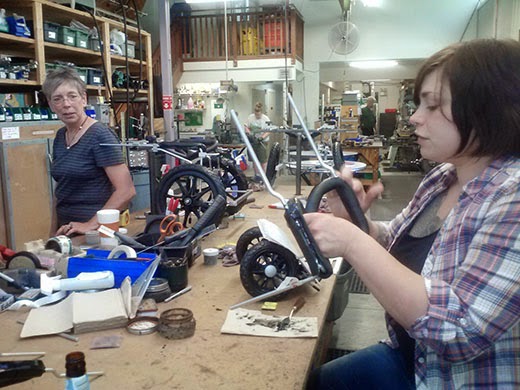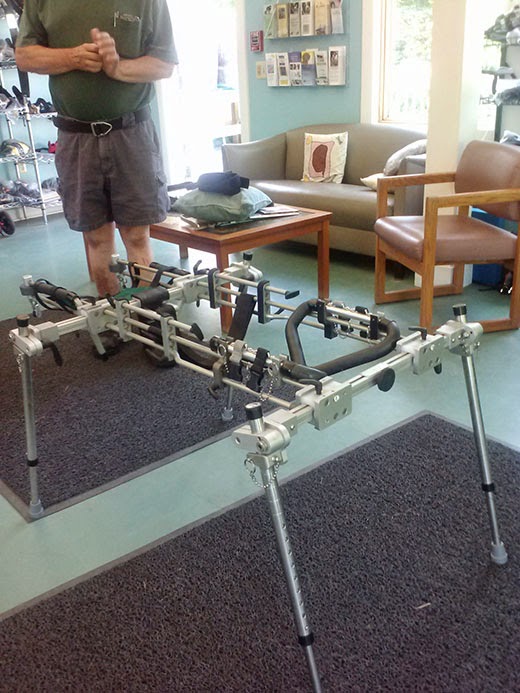 Susan Davis, PT of JoyCareOnsite.com gives further information on mobility carts for dogs in Wheeled Carts Keep Them Doggies Rollin' (Part II) These articles originally appeared on DawgBusiness.com.
Here is the promised list of several major wheeled cart companies.
Eddie’s Wheels for Pets
www.eddieswheels.com
Remember the famous line delivered by Renee Zellweger in Jerry Maguire: ….. “You had me at hello”..? Well, they had me way before hello. I met Leslie Grinnell, co-owner and wife of Eddie, in person at an animal rehabilitation conference in 2013 and bonded with this lovely woman instantly.
I have since traveled to their facility in Shelburne Falls, MA, spent quality time with Leslie and Eddie, toured the shop, met their employees, and received expert instructions on making cart adjustments. I’m a fan. But long before this I was convinced of their product’s superiority through experience ordering them for patients and seeing the beautiful design, quality and workmanship. Eddie Grinnell, a mechanical engineer, combined his expert skills with love of pets to invent a cart design which is closely aligned to the dog’s center of gravity and natural axis of motion at the hip and shoulder joints. This is very important in helping accurately mimic the pet’s normal movement and prevent pulling or strain.
The cart frame is made of solid aluminum, being durable yet light weight, with stainless steel set screws and wheel fittings. Eddie’s has a welded, padded saddle uniquely designed for various breeds to match the shape and angle of their pelvis, and provide comfortable support for the pelvic floor. Careful measurements are required, but can be taken by the family, veterinarian or therapist. Carts are fully adjustable, using some basic tools.
Are there any negatives to consider with Eddie’s Wheels? Honestly, no. Some folks might not like waiting 2-3 weeks for their cart to arrive, but after observing the effort and precision that goes into each one, it’s worth it. The carts are just a bit heavier than others’ (while being lightweight overall) but this would only be an issue with extremely frail dogs.
Susan Davis, PT of JoyCareOnsite.com gives further information on mobility carts for dogs in Wheeled Carts Keep Them Doggies Rollin' (Part II) These articles originally appeared on DawgBusiness.com.
Here is the promised list of several major wheeled cart companies.
Eddie’s Wheels for Pets
www.eddieswheels.com
Remember the famous line delivered by Renee Zellweger in Jerry Maguire: ….. “You had me at hello”..? Well, they had me way before hello. I met Leslie Grinnell, co-owner and wife of Eddie, in person at an animal rehabilitation conference in 2013 and bonded with this lovely woman instantly.
I have since traveled to their facility in Shelburne Falls, MA, spent quality time with Leslie and Eddie, toured the shop, met their employees, and received expert instructions on making cart adjustments. I’m a fan. But long before this I was convinced of their product’s superiority through experience ordering them for patients and seeing the beautiful design, quality and workmanship. Eddie Grinnell, a mechanical engineer, combined his expert skills with love of pets to invent a cart design which is closely aligned to the dog’s center of gravity and natural axis of motion at the hip and shoulder joints. This is very important in helping accurately mimic the pet’s normal movement and prevent pulling or strain.
The cart frame is made of solid aluminum, being durable yet light weight, with stainless steel set screws and wheel fittings. Eddie’s has a welded, padded saddle uniquely designed for various breeds to match the shape and angle of their pelvis, and provide comfortable support for the pelvic floor. Careful measurements are required, but can be taken by the family, veterinarian or therapist. Carts are fully adjustable, using some basic tools.
Are there any negatives to consider with Eddie’s Wheels? Honestly, no. Some folks might not like waiting 2-3 weeks for their cart to arrive, but after observing the effort and precision that goes into each one, it’s worth it. The carts are just a bit heavier than others’ (while being lightweight overall) but this would only be an issue with extremely frail dogs.
 New developments at Eddie’s Wheels: Wheeled Walkers designed for smaller pets under 30 pounds, who need light, full-body support for their mobility. New developments at Eddie’s Wheels: Wheeled Walkers designed for smaller pets under 30 pounds, who need light, full-body support for their mobility. |


